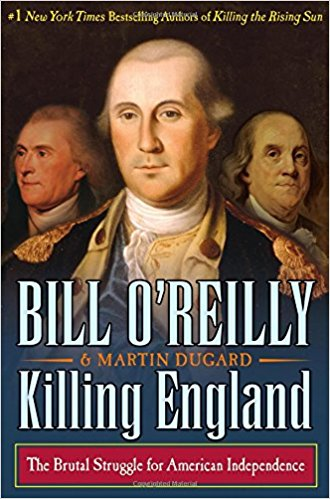"Killing England" by Bill O'Reilly and Martin Dugard

Above: "Killing England." Bill O'Reilly and Martin Dugard. 323 pages.
Also, one cannot help but be moved by the sacrifices made by the founders and their followers... particularly, when a majority of the residents of the thirteen colonies feared the British, thought they would prevail, and, therefore, were disinclined to stick their necks out.
I completed reading this book today.
I've enjoyed the other books I've read in O'Reilly's "killing" series, "Killing the Rising Sun," and "Killing Patton."
And so, also, this book.
"Killing England" is not the definitive book to read on America's declaration of independence and the Revolutionary War. It is, however, a short, well paced narrative that highlights the major characters, themes, and events of the founding period of the United States.
We get a feel for...
The resolve of "good" King George III and his disdain for the "colonial ingrates" who disrespect the crown.
Washington's plodding stick-to-it-ive-ness - and luck - in pursuing a war over eight (eight!) years against an army supposedly better trained and better prepared. Things often looked grim for the colonials...surviving the winter cold at Valley Forge, for example. Washington showed his downtrodden troops and skeptical Congress a spirit of optimism in the face of tribulation. There are some good lessons about leadership as the George Washington saga is revealed in this book.
Ben Franklin's libertine life in Europe and his estrangement from his loyalist son.
Thomas Jefferson's devotion to his sickly wife Martha and his reluctance to re-up in the fight for independence after his masterly work as the key writer of the Declaration of Independence. NOTE: Jefferson's second life with Sally Hemings is amply covered in the book.
The full details and scope of Benedict Arnold's treachery. Arnold could have ended up in the historical company of Grant, Custer, and Patton as a fighting general. But, he just couldn't bear being on the sidelines after suffering an injured leg at the Battle of Saratoga. Personal recognition and wealth, promised to him by the English, superseded loyalty to the Colonial cause.
John Paul Jones' successful campaign to harass English shipping right near the English homeland.
The standoff between the great cavalries in the south: Banastre Tarleton's dragoons (English) versus Francis "Swamp Fox" Marion's rangers (Colonials).
How Washington, French General Rochambeau, and French Admiral DeGrasse, bottled up British General Cornwallis, in the siege of Yorktown, the last great battle of the Revolutionary War.
The book is full of anecdotes and footnotes. For example, we learn that the rivalry between Tarleton and Marion formed the basis for Mel Gibson's move, "The Patriot."
These "killing" books are very readable and contain only the main points necessary to advance the narrative. Chapters are short, and broken up into easy to digest sub sections. Approach is mostly "here's what happened," without a lot of analysis and interpretation of historical implications.
If you have a general familiarity with American history during the revolutionary times and would like to revive some of your memories via an interesting and quick read, this book is highly recommended.
Perhaps the most important reason to read this book is that it is a short, but insightful, primer on how the US got started. It is important to revive America's founding story at a time when many Americans seem unappreciative of the aggregate prosperity, individual freedom, and safety never before accomplished at such a level by any nation other than the United States. The principals laid down by the founders are central to today's success. Tearing down those foundational principles, as some are wont to do today, will not lead to anything good. Also, one cannot help but be moved by the sacrifices made by the founders and their followers... particularly, when a majority of the residents of the thirteen colonies feared the British, thought they would prevail, and, therefore, were disinclined to stick their necks out Many of these... loyalists they were called... left for Canada when it became apparent that the Colonials would be granted independence. Its a "whole 'nother topic," but the loyalist/colonialist divide has been seen by some as being at the root of characterizations of the two peoples today ie Canadians being taciturn, cooperative, and polite. Americans being rowdy, rambunctious, and disrespectful.